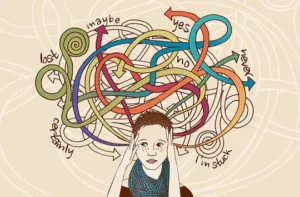Obsessive-compulsive disorder (OCD) is a mental health condition that can be extremely debilitating. Sufferers may experience intense fear and anxiety, as well as repetitive thoughts or behaviours that they find difficult to stop. In extreme cases, OCD can lead to severe physical health problems, including heart disease and arthritis. Fortunately, there are treatments available that can help sufferers manage their condition. In this blog post, we will discuss the treatment for severe OCD and provide helpful tips on how to find the right treatment for you. From medication to cognitive behavioural therapy (CBT), we have everything you need to get started on your road to recovery.
Contents
What is OCD?

OCD is a mental health condition characterized by intrusive, repetitive thoughts and concerns. The disorder can be extremely debilitating and even life-threatening. Treatment typically includes medication and/or therapy.
OCD is believed to be caused by abnormalities in the brain’s serotonin system. Some people with OCD may experience unusually high levels of serotonin in the brain, while others may have low levels of serotonin. There is currently no cure for OCD, but treatment options are available that can help ease the symptoms.
One common approach to treating OCD is medication. Selective serotonin reuptake inhibitors (SSRIs) are generally the most effective type of medication for treating OCD. These drugs work by boosting serotonin levels in the brain. Other types of medications used to treat OCD include tricyclic antidepressants, antipsychotics, and mood stabilizers.
Therapy can also be helpful for people with OCD. This type of treatment typically includes teaching patients about their illnesses and recommending strategies for managing their symptoms. therapies might also focus on changing negative thinking patterns or cognitive beliefs about OCD.
What Happens If OCD becomes severe?
 If OCD becomes severe, there are a few things that can be done. The first step is to see a doctor who can diagnose the problem and prescribe the appropriate treatment. There are many different types of treatments available, but some common ones include medication, psychotherapy, and cognitive behavioural therapy (CBT). Medications can be prescribed to help control the disorder, while psychotherapy and CBT help remodel the way the person thinks about and reacts to OCD symptoms. All three of these treatments require regular attendance and adherence to the treatment plan in order to be effective. If OCD becomes severe, it’s important to seek out professional help as soon as possible so that you can start on the path to managing this disorder effectively.
If OCD becomes severe, there are a few things that can be done. The first step is to see a doctor who can diagnose the problem and prescribe the appropriate treatment. There are many different types of treatments available, but some common ones include medication, psychotherapy, and cognitive behavioural therapy (CBT). Medications can be prescribed to help control the disorder, while psychotherapy and CBT help remodel the way the person thinks about and reacts to OCD symptoms. All three of these treatments require regular attendance and adherence to the treatment plan in order to be effective. If OCD becomes severe, it’s important to seek out professional help as soon as possible so that you can start on the path to managing this disorder effectively.
What is considered severe OCD?
OCD is a mental disorder that can make it difficult for someone to function in life. It is characterized by obsessions and compulsions, which are repeated thoughts or behaviours that the person cannot control. OCD can be very severe, and people with the condition may experience intense anxiety and fear. There is currently no cure for OCD, but there are treatments that can help people live better lives.
OCD can affect different parts of a person’s life. People with OCD may have intrusive thoughts (such as worries about contamination) that keep them from being able to sleep or focus on their work. They may also have repetitive actions (such as washing their hands over and over again) or rituals (such as counting steps).
Most people with OCD respond well to treatment, which typically includes therapy and medication. Therapy helps people learn more about their thoughts and feelings, while medications like SSRIs help reduce the symptoms of OCD. Some people require both therapy and medication to achieve full remission from OCD.
What are the different types of OCD treatments?
There are a variety of treatments for OCD, but most involve some combination of medication and therapy.
Medications used to treat OCD can include SSRIs (selective serotonin reuptake inhibitors), SNRIs (serotonin noradrenergic reuptake inhibitors), and tricyclic antidepressants. These medications help to improve the symptoms of OCD by increasing the levels of serotonin in the brain.
Some people find that medication is not enough to completely resolve their symptoms, so they may also seek out therapy. Therapy can be helpful in teaching people how to manage their OCD symptoms and improve their quality of life. Treatment options typically include cognitive-behavioural therapy (CBT) or psychodynamic therapy. CBT is a type of therapy that focuses on changing the way someone thinks about and responds to their obsessions and compulsions. Psychodynamic therapy focuses on understanding why a person’s thoughts, feelings, and behaviours are related to unresolved issues from their childhood.
There is no one treatment that is right for everyone, so it is important to speak with a therapist who will be able to offer you the best possible care.
How do the different types of OCD treatments work?
There are a number of different types of OCD treatments available, but each has its own unique set of benefits and drawbacks. Some of the most common OCD treatment options include medication, cognitive-behavioural therapy (CBT), and repetitive behaviour therapy (RBT).
Medication is often the first step in treating OCD and can be effective in relieving symptoms in a majority of patients. However, medications can also have side effects, which may require regular adjustments to ensure optimal relief. CBT is a popular form of OCD treatment that involves teaching patients specific behavioural techniques to reduce their anxiety and compulsions. CBT can be effective in reducing overall OCD symptoms, but it may take time for the full benefits to manifest. RBT is a relatively new form of OCD treatment that focuses on breaking the repetitive patterns of thoughts or behaviours that lead to distress. Although RBT is less commonly used than other treatment options, research suggests that it may be more effective than traditional CBT in treating severe cases of OCD.
What happens if severe OCD is left untreated?
 OCD is a debilitating mental illness that can severely limit a person’s ability to live a normal life. If left untreated, OCD can lead to sleeplessness, anxiety, and even suicidal thoughts. The good news is that there is a currently available treatment for OCD, which can help restore quality of life.
OCD is a debilitating mental illness that can severely limit a person’s ability to live a normal life. If left untreated, OCD can lead to sleeplessness, anxiety, and even suicidal thoughts. The good news is that there is a currently available treatment for OCD, which can help restore quality of life.
There are a variety of different approaches to treating OCD, and the best approach depends on the severity of the disorder and the individual’s symptoms. Some treatments include behavioural therapies such as CBT or Exposure and Response Prevention (ERP), medication such as SSRIs or tricyclic antidepressants, and complementary therapies such as yoga or meditation.
There is no one-size-fits-all approach to treating OCD, and each patient will need individualized care in order to achieve optimal results. However, early diagnosis and treatment are essential for restoring quality of life and preventing further complications down the road.
Conclusion
There is no one-size-fits-all answer to the question of what the treatment for severe OCD is, as each person’s case requires a tailored approach. However, many people find that medication and Cognitive Behavioral Therapy (CBT) are incredibly effective in treating OCD. If you are struggling with severe OCD and have tried all available treatments without success, it might be time to seek out professional help.
For more information and guidance, please contact OCDMantra. OCD is a mental health disorder characterized by obsessions and compulsions. If you have any queries regarding OCD treatment, OCD Counseling, ERP therapy experienced therapists at OCDMantra can help: Book a trial OCD therapy session


